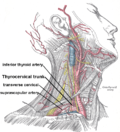Dorsal scapular nerve
Dorsal Scapular Nerve
The dorsal scapular nerve is a peripheral nerve that arises from the brachial plexus, specifically from the root of C5, and occasionally receives fibers from C4 or C6. It is primarily responsible for the innervation of several muscles in the back, including the rhomboid major, rhomboid minor, and the levator scapulae. These muscles play a crucial role in the movement and stabilization of the scapula, thus facilitating shoulder and arm movements.
Anatomy[edit]
The dorsal scapular nerve originates from the brachial plexus, more precisely from the ventral ramus of the fifth cervical nerve (C5). After its origin, it travels medially towards the scalenus medius muscle, passing between this muscle and the scalenus anterior. As it progresses, it moves deep to the levator scapulae and the rhomboids. Unlike most nerves, the dorsal scapular nerve does not pass through the middle scalene muscle.
Function[edit]
The primary function of the dorsal scapular nerve is to innervate the rhomboid major, rhomboid minor, and levator scapulae muscles. The rhomboids are responsible for retracting, elevating, and rotating the scapula downwards, while the levator scapulae elevates the scapula and tilts its glenoid cavity downwards. Through these actions, the dorsal scapular nerve plays a vital role in the movement and stabilization of the shoulder girdle.
Clinical Significance[edit]
- Nerve Entrapment
Dorsal scapular nerve entrapment can lead to pain and dysfunction in the shoulder and scapular region. Symptoms may include a dull ache or severe pain in the upper back, along with weakness or difficulty in moving the shoulder. Diagnosis is often made through physical examination and confirmed with nerve conduction studies.
- Physical Therapy
Treatment for dorsal scapular nerve issues often involves physical therapy, focusing on exercises that stretch and strengthen the shoulder muscles. Postural correction and ergonomic adjustments may also be recommended to alleviate symptoms.
See Also[edit]
-
Dorsal scapular nerve
-
Brachial plexus
-
Brachial plexus color
-
Thyrocervical trunk
Ad. Transform your life with W8MD's Budget GLP-1 injections from $75


W8MD offers a medical weight loss program to lose weight in Philadelphia. Our physician-supervised medical weight loss provides:
- Weight loss injections in NYC (generic and brand names):
- Zepbound / Mounjaro, Wegovy / Ozempic, Saxenda
- Most insurances accepted or discounted self-pay rates. We will obtain insurance prior authorizations if needed.
- Generic GLP1 weight loss injections from $75 for the starting dose.
- Also offer prescription weight loss medications including Phentermine, Qsymia, Diethylpropion, Contrave etc.
NYC weight loss doctor appointmentsNYC weight loss doctor appointments
Start your NYC weight loss journey today at our NYC medical weight loss and Philadelphia medical weight loss clinics.
- Call 718-946-5500 to lose weight in NYC or for medical weight loss in Philadelphia 215-676-2334.
- Tags:NYC medical weight loss, Philadelphia lose weight Zepbound NYC, Budget GLP1 weight loss injections, Wegovy Philadelphia, Wegovy NYC, Philadelphia medical weight loss, Brookly weight loss and Wegovy NYC
|
WikiMD's Wellness Encyclopedia |
| Let Food Be Thy Medicine Medicine Thy Food - Hippocrates |
Medical Disclaimer: WikiMD is not a substitute for professional medical advice. The information on WikiMD is provided as an information resource only, may be incorrect, outdated or misleading, and is not to be used or relied on for any diagnostic or treatment purposes. Please consult your health care provider before making any healthcare decisions or for guidance about a specific medical condition. WikiMD expressly disclaims responsibility, and shall have no liability, for any damages, loss, injury, or liability whatsoever suffered as a result of your reliance on the information contained in this site. By visiting this site you agree to the foregoing terms and conditions, which may from time to time be changed or supplemented by WikiMD. If you do not agree to the foregoing terms and conditions, you should not enter or use this site. See full disclaimer.
Credits:Most images are courtesy of Wikimedia commons, and templates, categories Wikipedia, licensed under CC BY SA or similar.
Translate this page: - East Asian
中文,
日本,
한국어,
South Asian
हिन्दी,
தமிழ்,
తెలుగు,
Urdu,
ಕನ್ನಡ,
Southeast Asian
Indonesian,
Vietnamese,
Thai,
မြန်မာဘာသာ,
বাংলা
European
español,
Deutsch,
français,
Greek,
português do Brasil,
polski,
română,
русский,
Nederlands,
norsk,
svenska,
suomi,
Italian
Middle Eastern & African
عربى,
Turkish,
Persian,
Hebrew,
Afrikaans,
isiZulu,
Kiswahili,
Other
Bulgarian,
Hungarian,
Czech,
Swedish,
മലയാളം,
मराठी,
ਪੰਜਾਬੀ,
ગુજરાતી,
Portuguese,
Ukrainian

